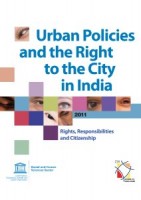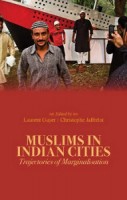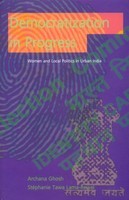“Urban Policies and the Right to the City in India: Rights, Responsibilities and Citizenship” by Marie-Hélène Zérah, Véronique Dupont, Stéphanie Tawa Lama-Rewal

- Year :2011
- Pages :180
- ISBN :978-81-89218-42-3
- Editor :United Nations Educational, Scientific, Cultural Organization UNESCO House and Centre de Sciences Humaines
This Research Policy Paper is the result of a collaboration between the CSH and the MOST-UNESCO Programme. It appears timely to open up this debate when various governmental programmes are being launched and when this question is debated internationally.
The “World Charter for the Right to the City”, elaborated at the Social Forum for the Americas (Quito, July 2004) and at the World Urban Forum (Barcelona, September 2004) resulted from a series of struggles, by various social movements and organizations, to promote a rights-based approach to the challenges of urbanization. This charter received the support of several local governments, which took up the task of elaborating city charters, and of international organizations, including the UN-HABITAT and the UNESCO. Since 2005, the UN-HABITAT and the UNESCO have launched a series of actions on the question of urban citizenship and the right to the city. In particular, in 2005, UNESCO and UN-HABITAT started a project entitled “Urban Policies and the Right to the City: Rights, Responsibilities and Citizenship” (Brown and Kristianson, 2009) and the latest UN-HABITAT report on the state of the world’s cities articulates the importance of taking forward the right to the city as a vehicle for social inclusion.
The objectives of this research-policy paper are twofold: (i) to discuss the Right to the City (RTTC) approach and to examine its analytical and pragmatic value for the case of Indian cities; and (ii) to take stock, on a number of themes (women in the city, access to decent housing and urban services, discrimination, livelihoods, land, etc.), of the existing situation and problems, including the legal and policy framework, and of the directions that are – or should be – taken towards the promotion of social justice. As part of this exercise, the report aims at assessing various public policies in terms of their inclusiveness, understanding their limits, and proposing a series of recommendations.









